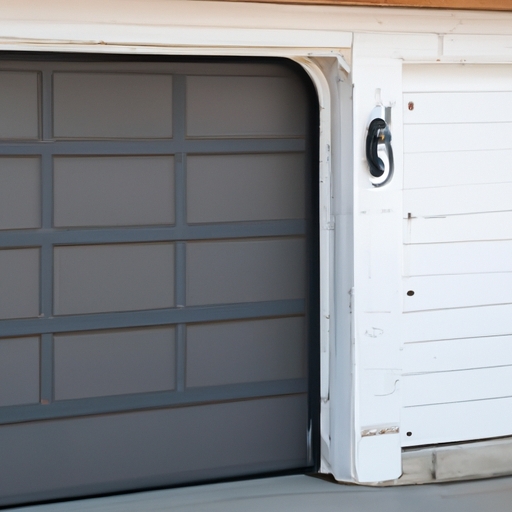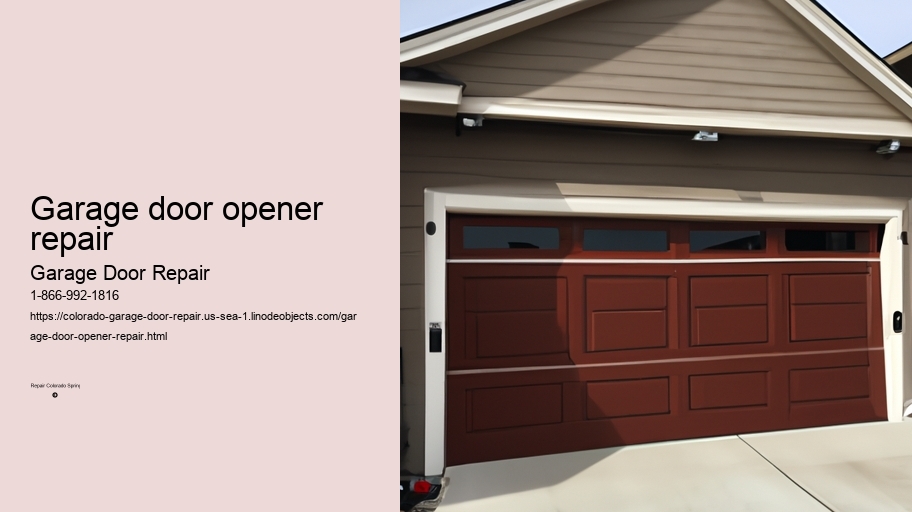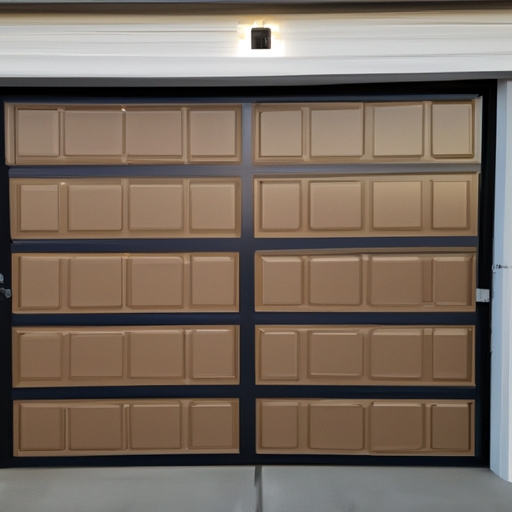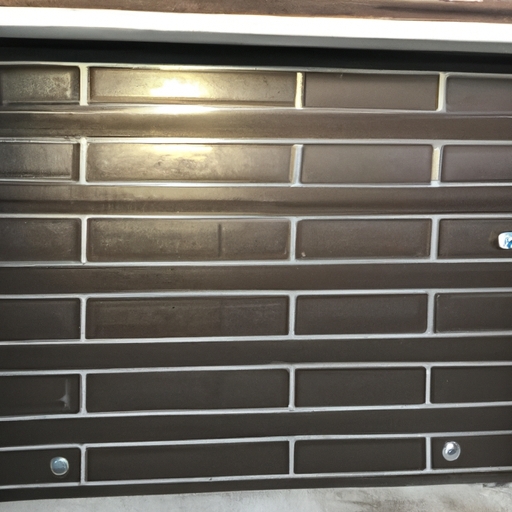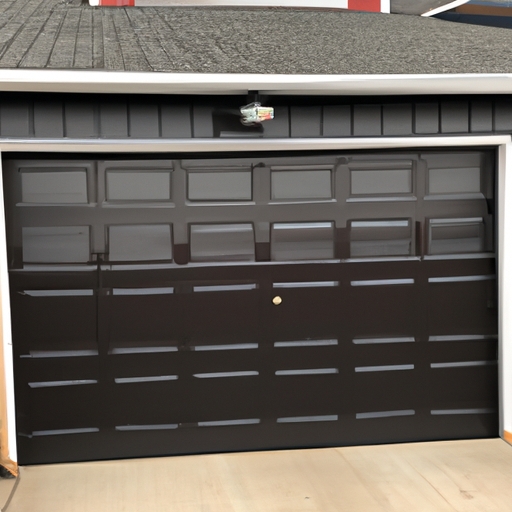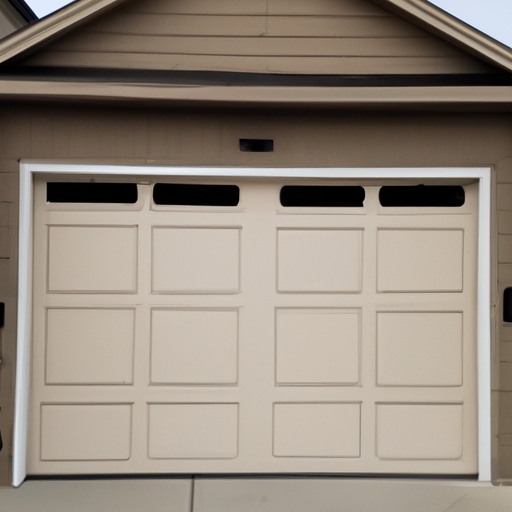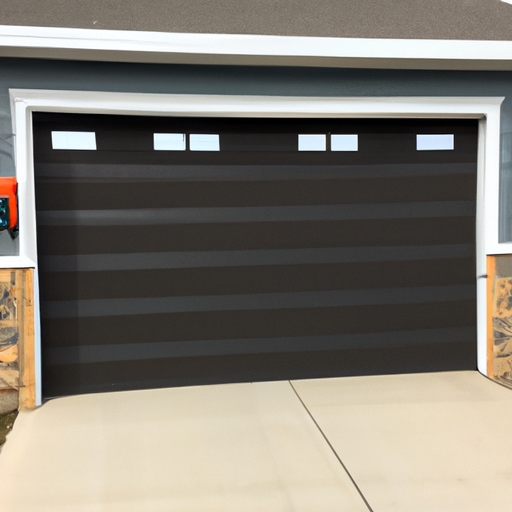Common issues with garage door openers
Common issues with garage door openers can be frustrating and inconvenient. (However), they are not uncommon in many households. When your garage door opener malfunctions, it can disrupt your daily routine and leave you feeling annoyed. (Well), there are several common problems that you may encounter when it comes to garage door opener repair.
One of the most common issues is a faulty remote control. Sometimes, the remote control fails to communicate with the garage door opener, leaving you unable to open or close the door. This problem often occurs due to dead batteries or a misaligned antenna. (Actually), it's quite important to check these simple things before assuming a bigger issue!
Troubleshooting steps for garage door opener problems
When it comes to garage door opener repair, troubleshooting steps can be quite helpful in resolving any issues that may arise. These steps allow homeowners to identify and fix problems with their garage door openers without the need for professional assistance, potentially saving time and money. So, let's dive into some common troubleshooting steps that can help you get your garage door opener back in working order!
Firstly, one of the most common issues (that) homeowners face with garage door openers is a lack of response when pressing the remote control button. If this happens, (then) it could indicate an issue with the power source or the batteries in the remote control itself. To troubleshoot this problem, start by checking if the opener is properly plugged into a power outlet. If it is and there's still no response, then try replacing the batteries in the remote control.
Moving on to another potential problem, sometimes garage doors may not fully close or open. This can be frustrating and inconvenient! One possible cause for this issue is misalignment of the safety sensors located at the bottom of the garage door tracks. These sensors are designed to detect any obstructions in the doorway and prevent accidents from occurring. However, if they are misaligned or blocked by debris (like leaves), they can malfunction and interfere with normal operation.
To fix this problem, make sure that there's nothing blocking or obstructing these sensors. Also check if they are aligned properly by ensuring that both sensors have a solid green light illuminated when not obstructed by anything. If one sensor has a blinking light or no light at all, then they need adjustment until both lights are solid.
Additionally (*transition*), if your garage door opener makes excessive noise while operating, it could indicate worn-out rollers or hinges that need lubrication (to operate smoothly). Over time, these components can become rusty or dry out due to lack of proper maintenance causing friction when moving. By lubricating the rollers and hinges with a silicone-based lubricant, you can reduce the noise and ensure smoother operation of your garage door opener.
In conclusion, troubleshooting steps for garage door opener problems can be a lifesaver! By following these steps, you can potentially resolve common issues with your garage door opener without needing to call a professional. Remember to check the power source and batteries, align the safety sensors, and lubricate any worn-out components. With these simple troubleshooting steps, you'll be able to get your garage door opener back in working condition (in no time)!
Tools and materials needed for repairing a garage door opener
When it comes to repairing a garage door opener, there are several tools and materials that are necessary. (Well), one of the most important tools is a screwdriver. (However), not just any screwdriver will do! You need a Phillips head screwdriver to properly remove and tighten the screws on the opener. Additionally, you'll also need pliers to help with any wire connections that may need fixing.
Another essential tool for garage door opener repair is a wrench. This handy tool will come in handy when dealing with nuts and bolts that may have loosened over time. (Actually), having an adjustable wrench is even better as it can fit various sizes of nuts and bolts. Furthermore, don't forget to grab a pair of safety gloves! These will protect your hands from any potential injuries while working on the opener.
In terms of materials, you'll definitely need replacement parts for your garage door opener if something is broken or worn out. Some common replacement parts include gears, belts, and circuit boards. It's always wise to have these spare parts on hand so that you can quickly replace them when needed. Moreover, (by the way), make sure you have lubricant as well! Applying lubricant to the moving parts of the opener will prevent rusting and ensure smooth operation.
Now that we've discussed the necessary tools and materials for repairing a garage door opener, let's move on to some general tips for successful repairs. First off, (well then), always disconnect the power supply before starting any repair work! This will prevent any accidental electrical shocks or damage to the opener. Secondly, take your time during the repair process; rushing can lead to mistakes or further damage.
To conclude, having the right tools and materials is crucial when it comes to repairing a garage door opener effectively. Don't forget about using safety gloves while working with your hands! Following proper precautions ensures both your safety and successful repairs for your beloved garage door opener.
Step-by-step guide to repairing a garage door opener
Garage door opener repair can be a daunting task, especially if you're not familiar with the inner workings of these contraptions. However, fear not! With this step-by-step guide, you'll be able to fix your garage door opener (which is totally broken) in no time!
Firstly, gather all the necessary tools for the job: a screwdriver, pliers, and wire cutters. Oh wait! Don't forget your safety goggles to protect your precious eyes from any flying debris! Once you have everything ready, it's time to get started.
The first thing you want to do is disconnect the power supply to avoid any unfortunate electrocutions. Safety first, folks! Then, locate the control panel on your garage door opener (which is probably hidden somewhere you'd least expect). Open it up by removing the screws using your trusty screwdriver.
Inside the control panel, you'll find a bunch of wires (oh boy!) connected to different parts of the opener. Carefully inspect each wire for any signs of damage or loose connections (because that's what usually happens). If you spot any issues, use your wire cutters and pliers to fix them right up.
Next up is checking the motor of your garage door opener. This mighty machine is responsible for lifting that heavy door (but sometimes it decides not to cooperate). Look out for any strange noises or vibrations coming from the motor - that could indicate a problem. If so, tighten any loose screws and give it a good ol' cleaning with a dry cloth.
Now comes the fun part - testing everything out! Reconnect the power supply and press that magic button on your remote control (wowza!). Watch as your garage door opens and closes smoothly like butter on toast (unless something went terribly wrong during repairs).
In conclusion... Ta-da! Your garage door opener should now be back in working order thanks to this handy-dandy guide. Remember, if you encounter any difficulties or the problem persists, it's always best to consult a professional (because let's face it, we're not all DIY experts). So go ahead and give your newly repaired opener a round of applause (or maybe just a pat on the back) for a job well done!
Transition phrase: Now that you know how to repair your garage door opener like a pro, let's move on to some maintenance tips!
Safety precautions to consider when working on a garage door opener
When it comes to garage door opener repair, safety precautions are of utmost importance. (Believe me,) working on a garage door opener can be dangerous if proper precautions aren't taken. (Oh boy,) you definitely don't want any accidents or injuries! So, let's take a look at some essential safety measures to consider before diving into the repair process.
First and foremost, (let me tell ya,) it is crucial to disconnect the power supply to the garage door opener. (Gosh!) You don't want any unexpected movements while working on it! Locate the power source and make sure to unplug it or switch off the circuit breaker that controls the opener. This step will prevent any potential electrocution incidents!
Additionally, (I gotta say) wearing protective gear is a must when dealing with garage door opener repairs. Donning safety goggles will shield your eyes from flying debris or small parts that might unexpectedly pop out during the repair process. Likewise, wearing heavy-duty gloves will protect your hands from sharp edges and potential pinching hazards.
Moreover, another important precaution is ensuring that the garage door is fully closed and secured before starting any repairs. Imagine trying to fix a faulty opener while the door suddenly decides to open itself! That would be quite risky! By making sure that the door is firmly shut and locked in place, you eliminate the possibility of accidental movement while you work.
In addition to these precautions, never underestimate the importance of reading and following manufacturer instructions carefully. Each garage door opener model may have specific guidelines for safe repair procedures; neglecting them could lead to disastrous consequences!
To conclude, prioritizing safety precautions when repairing a garage door opener is paramount. Taking steps such as disconnecting power supply, using protective gear, securing the door properly, and following manufacturer instructions can help avoid accidents or injuries during the repair process.
All in all, keep in mind that taking risks with your safety just isn't worth it. (Trust me,) accidents happen when we least expect them, so let's be responsible and prioritize our well-being. Happy repairing!
Tips for maintaining a properly functioning garage door opener
Garage door opener repair is an important topic for homeowners who want to keep their lives convenient and their garages secure. In order to maintain a properly functioning garage door opener, there are some tips that can be helpful (such as) in preventing malfunctions and ensuring smooth operation.
Firstly, it is crucial to regularly inspect the garage door opener for any signs of wear or damage. This includes checking the cables, springs, and tracks for any loose or broken parts. If (y'all) notice any issues, it's essential to address them promptly before they worsen!
Another tip (that y'all should) consider is lubricating the moving parts of the garage door opener on a regular basis. This can help prevent friction and ensure that everything moves smoothly. Be sure to use a high-quality lubricant specifically designed for garage doors(opener). Applying this lubricant at least once a year will greatly contribute to its longevity.
Additionally, keeping the remote control or keypad clean and free from debris (is such an easy thing!) can make a big difference in the performance of your garage door opener. Dust or dirt accumulation on these devices may interfere with signal transmission, causing delays or even complete malfunctioning.(Oh my goodness!)
Furthermore, it's important to test the safety features of your garage door opener regularly. This includes checking if the auto-reverse function works properly by placing an object underneath the closing door. If it fails to reverse upon contact with the object,(you really need) immediate repair.
Lastly(you know), maintaining proper balance is crucial for a well-functioning garage door opener. An imbalanced door can strain its components leading to premature wear and tear! To check if your garage door is balanced correctly(you bet!), disconnect it from the opener and manually lift it halfway up. If it stays in place without dropping or rising further(on another planet), then you're good to go!
In conclusion(yes indeed), proper maintenance and regular inspections are key to ensuring a properly functioning garage door opener. By following these tips, you can avoid costly repairs and enjoy the convenience of a reliable garage door opener for years to come. So go ahead(yes!), put these tips into action and keep that garage door opener in tip-top shape!
